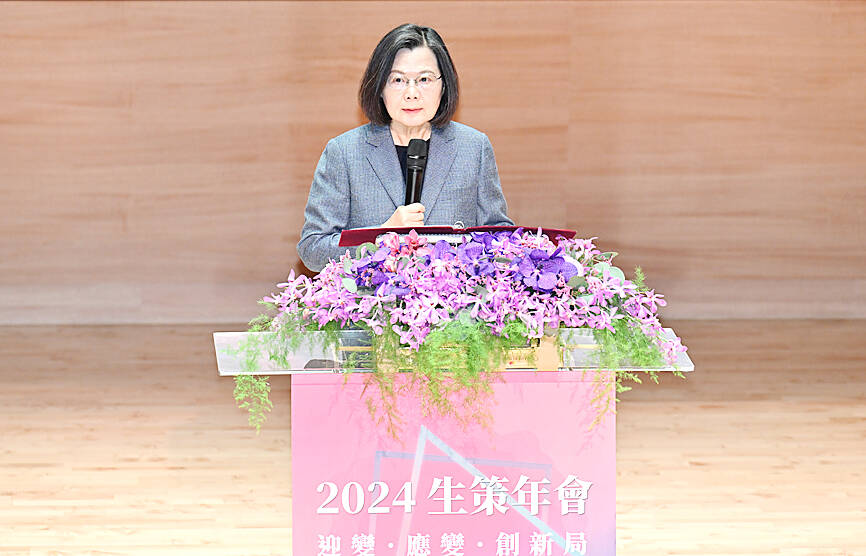President Tsai Ing-wen (蔡英文) and tech leaders at a conference on the biomedical industry yesterday praised the industry chain that has taken shape in Taiwan and artificial intelligence’s (AI) potential in healthcare.
In a speech at this year’s Institute for Biotechnology and Medicine Industry (IBMI) annual general meeting, Tsai said that during her eight years in office, the IBMI connected Taiwan’s medical, biotech and technology sectors in producing a biomedical industry chain.
“Building on the foundation of the National Health Insurance system and Biobank, we have developed a big data healthcare system,” Tsai said.

Photo: Tien Yu-hua, Taipei Times
The nation’s biomedical sector has harnessed these and other domestic technological advantages to expand international commercial opportunities, she said.
Tsai, who is to leave office in May, said Taiwan has become a crucial hub for international biomedical innovation and research, and she hoped for more cross-sector collaboration in Taiwan to further advance the biomedical industry.
Quanta Computer chairman and IBMI vice president Barry Lam (林百里) said that such collaboration would help bring AI to the nation’s healthcare and medical systems.
Through cooperation between academia, the healthcare system and the information technology sector, the power of new AI technologies could be harnessed and used to collectively address health and medical challenges.
“Generative AI not only represents the latest technological revolution, but also has immense potential to transform medicine, making it a likely major driver of the healthcare sector,” Lam said.
Asustek chairman and IBMI director Jonney Shih (施崇棠) presented his company’s approach to smart healthcare in a separate session at the conference on building a digital foundation for future healthcare services.
Shih said the COVID-19 pandemic had reshaped the medical and healthcare sectors, and accelerated their digital transformation in a way that could yield precision health and virtual care.
After playing a pre-recorded conversation of a patient seeking information on how to handle an ailment such as finding an appropriate doctor, from the company’s AI robot “Zenbo,” Shih said that the future of medical services would depend on innovative digital technologies centered around AI.

Alain Robert, known as the "French Spider-Man," praised Alex Honnold as exceptionally well-prepared after the US climber completed a free solo ascent of Taipei 101 yesterday. Robert said Honnold's ascent of the 508m-tall skyscraper in just more than one-and-a-half hours without using safety ropes or equipment was a remarkable achievement. "This is my life," he said in an interview conducted in French, adding that he liked the feeling of being "on the edge of danger." The 63-year-old Frenchman climbed Taipei 101 using ropes in December 2004, taking about four hours to reach the top. On a one-to-10 scale of difficulty, Robert said Taipei 101

Nipah virus infection is to be officially listed as a category 5 notifiable infectious disease in Taiwan in March, while clinical treatment guidelines are being formulated, the Centers for Disease Control (CDC) said yesterday. With Nipah infections being reported in other countries and considering its relatively high fatality rate, the centers on Jan. 16 announced that it would be listed as a notifiable infectious disease to bolster the nation’s systematic early warning system and increase public awareness, the CDC said. Bangladesh reported four fatal cases last year in separate districts, with three linked to raw date palm sap consumption, CDC Epidemic Intelligence

US climber Alex Honnold left Taiwan this morning a day after completing a free-solo ascent of Taipei 101, a feat that drew cheers from onlookers and gained widespread international attention. Honnold yesterday scaled the 101-story skyscraper without a rope or safety harness. The climb — the highest urban free-solo ascent ever attempted — took just more than 90 minutes and was streamed live on Netflix. It was covered by major international news outlets including CNN, the New York Times, the Guardian and the Wall Street Journal. As Honnold prepared to leave Taiwan today, he attracted a crowd when he and his wife, Sanni,

Taiwanese and US defense groups are collaborating to introduce deployable, semi-autonomous manufacturing systems for drones and components in a boost to the nation’s supply chain resilience. Taiwan’s G-Tech Optroelectronics Corp subsidiary GTOC and the US’ Aerkomm Inc on Friday announced an agreement with fellow US-based Firestorm Lab to adopt the latter’s xCell, a technology featuring 3D printers fitted in 6.1m container units. The systems enable aerial platforms and parts to be produced in high volumes from dispersed nodes capable of rapid redeployment, to minimize the risk of enemy strikes and to meet field requirements, they said. Firestorm chief technology officer Ian Muceus said